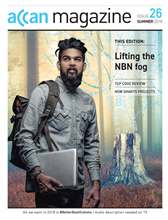- Details
The ACCC is conducting a Communications Sector Market Study, and has consulted on its draft report following its consultation last year on an Issues Paper. The ACCC’s draft report made a number of recommendations and proposed actions to improve telecommunications market and services for consumers over the next 5 years, which adopted many of the suggestions flagged in our Issues Paper submission.
- Details
New rules that will force telcos to significantly improve the consumer experience in moving to the NBN have been welcomed as an early Christmas present for consumers. ACCAN has been calling for some time for these issues to be addressed and we are very pleased with the Minister for Communications’ and the ACMA’s announcements. This is a huge win for consumers.
“The ACMA’s analysis of issues relating to NBN migration confirms what we already know, and highlights some very concerning complaint trends,” said ACCAN CEO, Teresa Corbin. “The findings reflect the consumer experiences ACCAN has been hearing about as customers switch over to the NBN.”
The ACMA’s report shows that there needs to be better protection to ensure that consumers have access to a working service, that they are given accurate and consistent information and that there is an improvement in complaints handling to ensure quicker resolution of faults and connection problems. Furthermore, the implementation of these new standards will ensure that if the nbn switchover does not work the previous service will be reconnected so no-one is left without these essential services. These are issues which ACCAN has been raising with the industry, regulators and government. These issues are summarised in our Migration Statement.
Read more: New telco rules an early Christmas present for consumers
- Details
ACCAN has welcomed the Government’s response to the Productivity Commission report into the existing Universal Service Obligation (USO).
We are pleased that the Government’s response acknowledges that existing arrangements are out of date and in need of reform. We welcome the Government’s commitment to provide universal access to voice and broadband services through a new Universal Service Guarantee (USG) once the NBN rollout is complete.
“All consumers need access to reliable and affordable voice and internet services,” said ACCAN CEO, Teresa Corbin. “Guarantees underpinning access to vital voice and internet services are fundamentally important for areas where the market is not delivering adequately.”
“We look forward to working with the government on this in 2018 and beyond.”
ACCAN will work to ensure the new USG addresses the need for assurances that any new service delivery arrangements will take account of:
- Details
In consultation with its members and other consumer groups, ACCAN responded to the ACMA’s consultation on the potential for industry self-regulation of the IPND, DNCR, and spam.
ACCAN believes it is in the consumer interest that functions of the IPND, DNCR, and commercial electronic messages are not referred to industry for regulation.
Passing regulatory functions currently undertaken by government to industry could have detrimental privacy and cost implications. It also has the potential to impact on complaints handling, enforcement and compliance, and the transparency over the ways in which these activities are undertaken.
- Details

Download: ![]() ACCAN Magazine Issue 26 Summer 20182.8 MB (Note: reading order not accessible)
ACCAN Magazine Issue 26 Summer 20182.8 MB (Note: reading order not accessible)
Download accessible version: ![]() ACCAN Magazine Issue 26 Summer 2018 - accessible version41.03 KB
ACCAN Magazine Issue 26 Summer 2018 - accessible version41.03 KB
- Details
 ACCAN’s submission to the Independent Review into the Telecommunications Industry Ombudsman (TIO) highlighted the important role of the TIO, but also identified a number of areas for improvement.
ACCAN’s submission to the Independent Review into the Telecommunications Industry Ombudsman (TIO) highlighted the important role of the TIO, but also identified a number of areas for improvement.
The final report agreed with ACCAN’s recommendations that there is a need for:
Read more: Positive outcomes from TIO review
Write comment (0 Comments)- Details
ACCAN contributed to the Financial Rights Legal Centre’s joint consumer submission on the Review of the Privacy (Credit Reporting) Code 2014 (CR Code). The other contributors included the Australian Privacy Foundation, the Consumer Action Law Centre, the Consumer Credit Legal Service (WA), and Financial Counselling Australia.
The CR Code makes up part of Australia’s credit reporting scheme, and is important as it strengthens consumer privacy protections. The joint consumer submission makes 34 recommendations on a wide range of consumer issues including: Repayment History Information and financial hardship; the need for independent code governance; the inclusion of credit scores on free credit reports; ongoing problems with accessing free credit reports; and many others.
Read more: Joint submission to Review of the Privacy (Credit Reporting) Code 2014
- Details
ACCAN provided comments to the Communications Alliance on the Prepaid Calling Card Guideline. The original purpose of the Guideline was to ensure that consumers were adequately informed when making a decision on which calling card to buy. ACCAN submitted that the current Guideline no longer achieves this purpose and that its objectives should be redrafted to reflect its actual content. This is because a 2015 review of the Guideline removed a majority of content that was replicated in the Australian Consumer Law and by the Telecommunications Consumer Protections Code. The Guideline now only contains two sections; one on Emergency Services Requirements, and another on general rules. ACCAN submitted that if the Guideline were to be withdrawn, it should be on the condition that these two sections are moved to a new enforceable instrument.
Read more: Revision of the Prepaid Calling Card Guideline (G640:2015)
- Details
As a member of the Broadband for the Bush Alliance (B4BA), ACCAN contributed to a response to the NT Government’s discussion paper, Towards a digital strategy for the NT. The paper clearly outlines many of the benefits of increased connectivity and ICT innovation for Territorians. However, B4BA argues in its submission that in order to design and implement an effective digital strategy, current barriers to affordable, accessible, and reliable telecommunications services must be addressed.
Importantly, B4BA has recommended that the NT Government’s digital strategy should prioritise achieving basic levels of access for all Territorians. This would include providing reliable and affordable broadband internet in the 44 communities where it is not yet available, and mobile services in the 30 communities where there currently are none.
Read more: Towards a Digital Strategy for the Northern Territory
- Details
The Australian Competition and Consumer Commission (ACCC) has powers to request information from providers in the telecommunications market about telecommunications infrastructure. These powers are an important tool to inform the ACCC’s work. As an example, the ACCC could use these powers to request information about infrastructure like the mobile networks owned by Telstra, Optus and Vodafone.
The ACCC is consulting on improvements and revisions to the information it requests from telco infrastructure providers. ACCAN welcomes the proposed changes to these rules as they benefit competition in the telecommunications markets.
Read more: Audit of Telecommunications Infrastructure Assets – Record Keeping Rules 2013
- Details
The summary below outlines ACCAN's activities from 1 June – 31 August 2017.
- Details
 With many people travelling or taking time off over the holidays, we thought we’d share some tips to help you keep track of your data usage, use your phone overseas and get issues resolved.
With many people travelling or taking time off over the holidays, we thought we’d share some tips to help you keep track of your data usage, use your phone overseas and get issues resolved.
Mobile
If you are travelling locally you may be more reliant on your smartphone and you might find your data allowance getting used up more quickly. Check out our tip sheet on how to use less data on your smartphone and our blog on how much excess data will cost you.
Read more: Phone and internet tips for the holidays
Write comment (0 Comments)